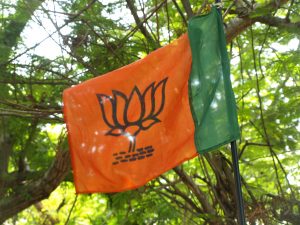According to Indian media reports, the ruling Bharatiya Janata Party (BJP) has confirmed that its U.S. wing, the Overseas Friends of BJP–USA (OFBJP-USA), has registered itself under the U.S. Foreign Agents Registration Act (FARA). The August 27 registration, a first for a mainstream Indian political party, requires the OFBJP-USA, a nonprofit incorporated in New Jersey, “to make periodic public disclosure of their relationship with the foreign principal, as well as activities, receipts and disbursements in support of those activities,” according to the U.S. Department of Justice (DOJ). The FARA enforcement unit falls under the DOJ’s National Security Division’s Counterintelligence and Export Control Section.
The Hindu reported sources had told the newspaper that in April of this year, the DOJ announced it was looking to enforce FARA more vigorously, and had sent out notices to suspected foreign agents to either register under the Act or stop representing foreign principals. According to the newspaper, the BJP has denied receiving any such notice.
OFBJP-USA’s FARA registration comes at a time when sections of the party have shown an open preference for President Donald Trump’s reelection at the upcoming U.S. election. Most strikingly, at a rally in Houston last September, Indian Prime Minister Narendra Modi figuratively, if not literally, endorsed Trump – a first for a country whose leadership has traditionally eschewed making comments on the domestic affairs of other nations. Since then, as Trump’s reelection prospects have significantly worsened, the BJP has adopted a more cautious tone. The BJP’s Foreign Affairs Department head, Vijay Chauthaiwale, has written to OFBJP-USA members asking them not mention the party while campaigning in the American elections.
Bad optics aside, while registration under FARA itself implies no wrongdoing – assuming it was voluntary, as the BJP claims, and not forced by the U.S. government – the whole episode brings three aspects of the Modi’s government’s international dealings once again into the fore: a growing risk appetite; an increasing prickliness about foreign criticism; and an almost concomitant inability to gauge the mood in western democracies.
Modi’s decision to endorse Trump and his party’s willingness to mobilize sections of the Indian-American community to advance controversial causes – such as promoting the August 2019 decision to revoke Kashmir’s autonomy – is but one illustration of India’s increasing risk appetite. At the time of the effective abrogation of Article 370 of the Indian Constitution, which granted the erstwhile state of Jammu & Kashmir special status within the country’s federal framework, OFBJP-USA President Krishna Reddy gushed: “It is a historic day as Modi government could deliver a long-awaited decision of scrapping article 370 and corrected the historic blunder made by the Nehru government.” (According to the OFBJP-USA twitter account, Reddy stepped down as president on September 10 due to “family reasons.”)
The Trump administration shied away from criticizing India’s move. However, many in the Democratic Party took umbrage, including Kamala Harris, Joe Biden’s running mate in the November elections. While the BJP was aggressively betting on Trump, as well as conservative Hindu-Americans of Indian origin, it forgot to factor in the possibility that a year later the bet may not pay off.
At the same time, the Modi government has remained intensely sensitive to foreign criticism and has sought to balance or challenge it – even if that means using outfits of murky provenance or running the risk of overreaction. Delivering a public lecture in New Delhi last November, India’s External Affairs Minister S. Jaishankar bluntly asserted that his reputation was “not decided by a newspaper in New York,” in the context of growing criticism abroad about India’s Article 370 move. (The New York Times, especially its opinion pages, remains a favorite target of criticism for BJP members.) And yet, according to OFBJP-USA’s certificate of incorporation, “work towards projecting a positive and correct image of India and its people in the U.S. and foreign media, and correct any distortions in the media’s reporting of current events taking place in India” is one of its principal objectives.
But the strangest part of the BJP’s aggressive outreach in the U.S., U.K. and Australia – efforts that sometimes verge on influence operations – has been its inability to comprehend how sensitive these countries are to any hint of foreign interference, following the Russian and Chinese meddling of the past few years. To be sure, there is no evidence that the OFBJP-USA works on behalf of the Indian government or that it poses the same kind of threat as, say, Chinese United Front Work operations do. But the very fact that it runs the risk of being perceived in the same malign league should give the BJP, and the Modi government, pause.

































